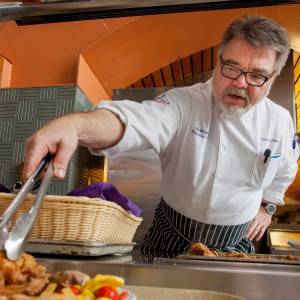January marked the beginning of the Sewanee Food Literacy Project.
January marked the beginning of the Sewanee Food Literacy Project, a semester devoted to empowering and engaging students to help them make informed choices and understand what “food literacy” means to an individual, the community, and the world.
The term “food literacy” describes the idea of proficiency in food-related skills and knowledge, and an understanding of the impact of food choices on health, the environment, and the economy.
 Rick Wright, director of Sewanee Dining, believes that being food literate empowers us to make informed and conscious choices. “We want to provide food education in a way that’s fun, approachable, and practical,” says Chef Rick, as Wright is known on campus.
Rick Wright, director of Sewanee Dining, believes that being food literate empowers us to make informed and conscious choices. “We want to provide food education in a way that’s fun, approachable, and practical,” says Chef Rick, as Wright is known on campus.
Events have included lessons in making soup and DIY sushi, a Japanese curry demo, and a screening of the documentary Fresh, which focuses on sustainable agriculture. A nutritionist has given talks on mindful eating and on nutrition for exercise and performance. Each Monday a designated screen-free lunch table promotes both mindful eating and good conversation. And each month, Sewanee Dining collaborates with the Wellness Center to provide a family-style dinner hosted by a theme house or Greek house on campus. Tools, ingredients, and instruction are provided—students prepare and enjoy the meal together.
 One of the highlights of the semester is a spring “hootenanny” in McClurg Dining Hall that brings together students, the community, and local farmers for an evening of farm-to-table food, music, and dancing.
One of the highlights of the semester is a spring “hootenanny” in McClurg Dining Hall that brings together students, the community, and local farmers for an evening of farm-to-table food, music, and dancing.

